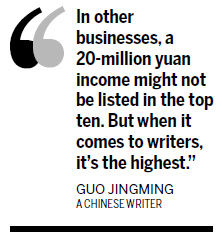Guo Jingming tops rich writers' list
Updated: 2011-11-22 08:01
By Mei Jia (China Daily)
|
|||||||||||
BEIJING - An icon to teenagers, Guo Jingming, 28, shines with his wealth again, by topping the Rich List of Chinese Writers, 2011, having earned 24.5 million yuan ($3.85 million) in copyright fee.
Colombian writer Gabriel Garcia Marquez is Guo's foreign counterpart to have earned the most in the mainland's book market, totting up 11 million yuan.
The lists, published on Monday, show top 30 Chinese writers in terms of copyright income, as well as the top 15 foreign writers with maximum earnings in China.
The second and third names on the Chinese writers' list are Nanpai Sanshu
|
 |
Wu Huaiyao, who has been drawing up these lists for six years, told China Daily on Monday that these worked as an index and also a mirror of the reading scene of the country.
"I found that the publishing market has shrunk compared to previous years, for lack of a super bestseller," Wu said. "But young readers, from 6 to 18, remain the majority of Chinese readers and consumers of books."
Wu started surveying the scene since July, assisted by a six-member team. He applied a method, "primitive but precise" as he called it, based on field investigations involving every level of participants in the book market, working for months together in major Chinese cities.
The lists he released in the past five years have stirred a wide debate. The credibility of these have been questioned, given most Chinese are usually reluctant to talk about how much money an author makes. Also measuring the worth of a writer in terms of his earnings is not always seen in a favorable light.
Yang Hongying, popular children's book writer who ranked fourth this year and came first in the 2010 list, said she had hoped that money would not be a distraction in judging and reading her works.
"Being on the lists has nothing to do with one's writing level," Wu argued, "It just signifies that certain features in these writers are loved and recognized by the public."
Wu also hoped that the lists draw attention to Chinese writers. Except for the ones listed, the rest were torn between having to make a living and realizing their dreams, he said.
"No matter what others may comment, I've been cheering up Chinese writers by drawing up these lists for six years," Wu said.
Li Yao, from Thinkingdom House, the copyright holder of Marquez's One Hundred Years of Solitude in simplified Chinese, agreed that Wu's lists reflected reading trends.
The publication of an authorized Chinese translation of Marquez's book pushed the author to the top of the list. This is being seen as a welcome sign that more people are reading literature.
"Wu's lists may not be accurate in terms of figures. But the top 15 foreign writers are indeed the 15 most-loved by Chinese readers," Li said. "And it shows reading classics has become trendy in 2011."
Writer Shi Hang said that the lists showed a more internationalized side of Chinese reading and publishing.
"Young people form the main body of readers in countries outside China too, which is a good sign," Shi said. "The ability of writers to attract young readers is significant and powerful."
While earlier authors would be embarrassed and often reluctant to talk about being the "richest Chinese writers", both Guo Jingming and Zheng Yuanjie, who figured among the top five the last six times, seemed reconciled to having emerged at the top of the heap, as their respective micro blogs showed.
"In other businesses, a 20-million yuan income might not be listed in the top ten," Guo said. "But when it comes to writers, it's the highest."
Hot Topics
HIV/AIDS, Egypt protest, Thanksgiving, climate change, global economic recovery, home prices, high-speed railways, school bus safety, Libya situation, Weekly photos
Editor's Picks

|

|

|

|

|

|







